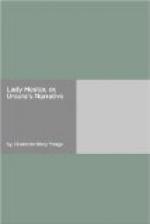Poor Emily! she had grown a great deal older in those six years. At eighteen she had implicitly believed in her mother. Mrs. Deerhurst had been so good all those years of striving not to frighten my father, that she had been perfection in her daughter’s eyes. Emily had believed with all her heart in her apparent disinterestedness, and her hopes and sympathy for us were real; and so, when the crash really came, and she told the poor girl with floods of tears that it was impossible, and a thing not to be thought of, for a right-minded woman to unite herself to a man of such birth. And poor Emily, with the conscious ignorance of eighteen, believed, and was the sort of gentle creature who could easily be daunted by the terror that her generous impulses to share the shame and namelessness were unfeminine and wrong. The utter silence had been the consequence of her mother assuring her, with authority, that the true kindness was to betray no token of feeling that could cherish hope where all was hopeless, and that he would regret her less if she commanded herself and gave him no look.
It had been terrible, calm self-command, and obedience to abused filial confidence in her mother’s infallibility.
And then Mrs. Deerhurst had been sinking ever since in her daughter’s esteem, as Emily could not but rise higher from the conscientious struggle and self-denying submission, and besides grew older and had more experience; while Mrs. Deerhurst, no doubt, deteriorated in the foreign wandering life, and all her motives made themselves evident when she married the younger daughter.
Emily had thought for herself, and seen that advantage had been taken of her innocence, and that her betrothed had rights, which, if she had been older, she would not have been persuaded to ignore. But coming home, two years later, and meeting my cold eyes and Fulk’s ceremonious bow, and hearing on all parts that he had accepted his position and had a hard struggle to maintain his two sisters; she, knowing herself to be portionless, could but suffer, and be still.
Of course every attempt of her mother’s to get her to marry advantageously, and, even more, Mrs. Deerhurst’s devotion to Lady Hester, tore away more and more of the veil she had tried to keep over her eyes; and as her youngest sister grew up into bloom, and into the wish for society, Emily had been allowed more and more to go her own quiet way in the religious and charitable life of Shinglebay, where she had peace, if not joy.
And then came the Dayman affair, when all the old persecution revived again, and Emily’s foremost defence against him, her blushing objection to his birth, was set aside as a mere prudish fancy of a young girl.
The gentle Emily had been irate then, and all the more when her mother tried to cover her inconsistency by alleging that everybody knew of Lord Torwood’s fall, whereas no one knew or cared who Francis Dayman was, or where he came from. Henceforth Emily’s shame at the usage of Fulk had been double—or rather it turned into indignation. Reports that he was to marry a rich grazier’s daughter had no effect in turning her in pique to Dayman. She had firmly told her mother that if it were wrong for her to take the one, it must be equally so to take the other.




